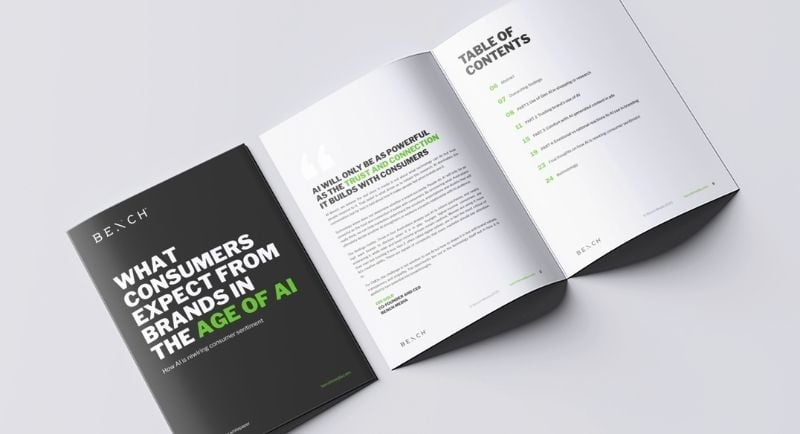Australians are embracing generative AI in shopping but are still split on how much they trust brands to use it responsibly, according to new research by independent media agency, Bench Media.
The report, What Consumers Expect from Brands in the Age of AI, found three in four Australians are using tools such as ChatGPT and Google Gemini to research or compare purchases. Nearly half (47%) want brands to disclose when AI is in play, and 82% believe companies should face stricter regulation.
Ori Gold CEO and Co-Founder, Bench Media said: “AI will only be as powerful as the trust and connection it builds with consumers. Our research shows Australians are not asking whether AI should exist in marketing, they are asking how it is used, how it is disclosed, and whether it aligns with brand values. That is the challenge CMOs need to solve.
“The smartest brands in 2025 will not be the ones with the most AI, they will be the ones that use it with the most emotional intelligence,” he added.
A generational divide is clear. Younger Australians, especially 25–44-year-olds, are adopting AI for shopping, travel, dining and work tasks. Gen Z also leads in weekly usage, though 44% say humans remain better at creativity. In contrast, older Australians are more cautious, placing higher value on human interaction.
The white paper delved into four key parts, concluding with a clear message for marketers that AI is not a one-size-fits-all solution. Key highlights include:
• Nearly one in five Australians uses generative AI daily to help decide what to buy. For younger demographics, particularly 25 – 44-year-olds, AI is becoming the default tool for shopping, planning travel, and even making dining choices. Among 18–24s, six in ten use AI at least weekly for product research.
• While 54% of Australians say they trust generative AI platforms for product research, 22% express outright distrust. That scepticism is amplified in lower-income households, where concerns about data use and digital literacy remain significant barriers.
• Gender adds another layer of complexity, with women using AI more frequently than men, with 52% of women reporting weekly use compared to 42% of men.
• Gen Z, often positioned as “digital natives,” frequently use AI, but are more likely than any other demographic to doubt its creative ability, with 44% of 18 – 24-year-olds believing humans still do a better job.
• Nearly half of Australians (47%) say they want brands to clearly disclose when AI is being used, while 60% believe that all AI-generated advertising should be clearly labelled.
• This demand for openness reflects deeper concerns around data and authenticity, plus regulation is another area of rare consensus. Across age, income, and gender, 82% of Australians believe brands should be more strictly regulated in their use of AI.
• More than half (51%) of Australians say they are comfortable with AI models or visuals in ads, and 57% believe AI can be just as creative as humans. Yet three-quarters believe AI-generated models promote unrealistic beauty standards.
• The study found that while 30% of Australians believe the ideal customer experience blends AI-driven efficiency with human empathy, this preference is especially pronounced among older Australians who value human interaction. Younger consumers, by contrast, prioritise speed and convenience, but only if it comes with transparency and creative integrity.
Industry leaders have welcomed the research as a timely contribution with Jonas Jaanimagi, Technology Lead at IAB Australia, described the white paper as “a solid start for those looking to embrace the core capabilities within this fast-evolving space,” noting its balance of data-driven insights with practical guidance for empathetic campaigns.
Associate Professor Ofer Mintz of UTS added that marketers need to “consistently consider the customer-based reactions to the latest AI trends” to ensure their organisations remain customer-centric.
Gold said: “AI is no longer a futuristic concept, it’s already reshaping how marketers connect and engage with audiences.
“This research underscores the importance of combining technological capability with human understanding, which is exactly where the real competitive advantage will lie.”
